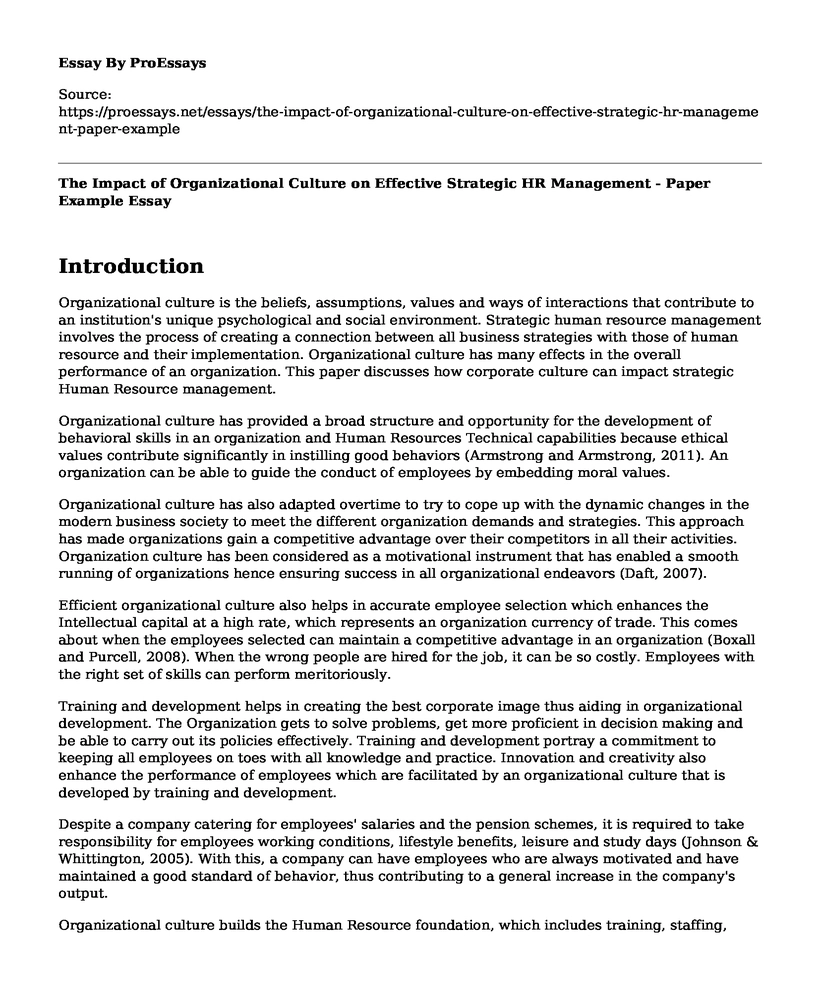Introduction
Organizational culture is the beliefs, assumptions, values and ways of interactions that contribute to an institution's unique psychological and social environment. Strategic human resource management involves the process of creating a connection between all business strategies with those of human resource and their implementation. Organizational culture has many effects in the overall performance of an organization. This paper discusses how corporate culture can impact strategic Human Resource management.
Organizational culture has provided a broad structure and opportunity for the development of behavioral skills in an organization and Human Resources Technical capabilities because ethical values contribute significantly in instilling good behaviors (Armstrong and Armstrong, 2011). An organization can be able to guide the conduct of employees by embedding moral values.
Organizational culture has also adapted overtime to try to cope up with the dynamic changes in the modern business society to meet the different organization demands and strategies. This approach has made organizations gain a competitive advantage over their competitors in all their activities. Organization culture has been considered as a motivational instrument that has enabled a smooth running of organizations hence ensuring success in all organizational endeavors (Daft, 2007).
Efficient organizational culture also helps in accurate employee selection which enhances the Intellectual capital at a high rate, which represents an organization currency of trade. This comes about when the employees selected can maintain a competitive advantage in an organization (Boxall and Purcell, 2008). When the wrong people are hired for the job, it can be so costly. Employees with the right set of skills can perform meritoriously.
Training and development helps in creating the best corporate image thus aiding in organizational development. The Organization gets to solve problems, get more proficient in decision making and be able to carry out its policies effectively. Training and development portray a commitment to keeping all employees on toes with all knowledge and practice. Innovation and creativity also enhance the performance of employees which are facilitated by an organizational culture that is developed by training and development.
Despite a company catering for employees' salaries and the pension schemes, it is required to take responsibility for employees working conditions, lifestyle benefits, leisure and study days (Johnson & Whittington, 2005). With this, a company can have employees who are always motivated and have maintained a good standard of behavior, thus contributing to a general increase in the company's output.
Organizational culture builds the Human Resource foundation, which includes training, staffing, performance management, talent management, compensations, development, benefits, and employee relations, therefore, setting the predictors and tones of employee morale thus their performance, which directly affects the organizational productivity.
A good organizational culture also ensures that the organization adopts an Innovative approach in all its operations. This involves how an organization interacts with the members of staff and how it conducts its business. A company portraying a decent image and allowing its employees to attend industrial events helps in making the employees to the cope with the current trends hence advancing in their areas of work. This values make an organization to achieve most of its goals.
A cool organizational culture also enhances Employees satisfaction; which encourages honest feedback and openness from Employers. When an employer creates an open environment, employees can share ideas and suggestions (Lorsch and McTague, 2016). When strategies of a well-established feedback environment are monitored, business owners can see the level of employee's satisfaction and are able to handle an upcoming issue.
A working organizational culture also motivates committed leadership. A company's leadership involves all team members engaged in management positions (Hutton, 2010) Leadership is a very crucial component and should be handled well in every organization. This is because company culture can only be maintained through having clear, inclusive leadership and committed personnel thus leading to ability to aptly handle all situations that can come up in an organization.
Conclusion
Generally, it can be concluded that corporate culture has a big impact on the use of SHRM. Cultures that focus on teamwork and cooperation for development enhance the implementation of strategic Human Resource Management while organizations that overlook the importance of cooperation are likely to fail at implementing SHRM.
References
Armstrong, M., & Armstrong, M. 2011. Armstrong's Handbook of Strategic Human Resource Management. London, Kogan Page.
Boxall, P. and J. Purcell.2008. Strategy and Human Resource Management, 2nd edition, Houndsmills: Palgrave McMillan.
Daft, R .2007. Organization Theory and Design (10th Ed.), Cincinnati, OH: Southwestern
Hutton, W. 2010. Foreword, UK's Best Workplaces: Special Report, May, Great Place to Work Institute UK, 4.
Johnson, G. Scholes, Whittington, R. 2005. Exploring Corporate Strategy Harlow: Prentice Hall
Lorsch, J. and McTague, E. 2016. Culture Is Not the Culprit. Harvard Business Review.
Cite this page
The Impact of Organizational Culture on Effective Strategic HR Management - Paper Example. (2022, Jul 20). Retrieved from https://proessays.net/essays/the-impact-of-organizational-culture-on-effective-strategic-hr-management-paper-example
If you are the original author of this essay and no longer wish to have it published on the ProEssays website, please click below to request its removal:
- Competent Organizational Leadership of Coca-Cola Company
- Essay Sample on The Ecclesial Leadership
- Catching the Interests of Physician Leadership Essay Example
- Tencent's Rise: Leadership, Change Management and Restructuring - Essay Sample
- Job Satisfaction & Organizational Justice: A Study of UAE Employees - Essay Sample
- Essay Sample on 7 Steps to Transform an Organization's Culture
- Essay Example on Jane and John: Conflict in Apple's Finance Department







